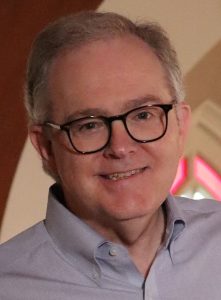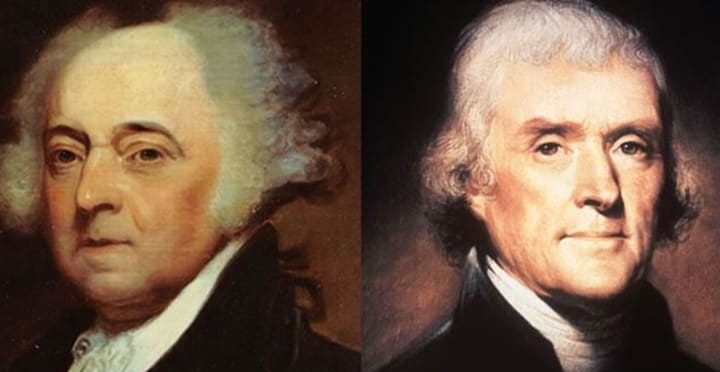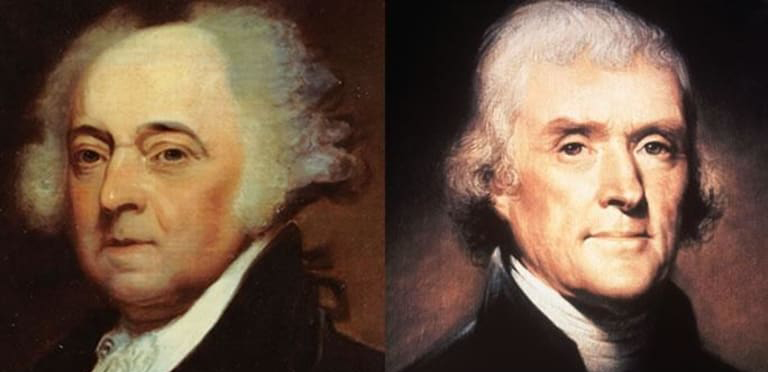The election to choose who would succeed George Washington as president, held in 1796, was a bitter contest marked by meanness, vindictiveness, insults and lies. Vice President John Adams eventually would defeat Secretary of State Thomas Jefferson, his opponent, but along the way these Founding Fathers were nothing like members of some mythical band of Christian saints worthy of emulating.
For his part, Adams and his associates attacked Jefferson as a being a coward during the American Revolution, a nonbeliever who had edited his own version of the Bible by literally cutting out supernatural events, including the resurrection of Jesus — a real document any visitor to Monticello can see facsimiles of today — and with racist fearmongering of the day that Jefferson’s father was of mixed race and, should Jefferson be elected president, he would emancipate all enslaved peoples.

Bob Guffey
Jefferson and his party attacked Adams as scheming to become a king and autocrat, as being grossly overweight and a sexual deviant and, in at least one accounting, to actually having died, so voters need not waste their votes. That these two men eventually renewed a lifelong friendship is rather astounding.
A colleague recently posted about elections on social media a quote by John Wesley, 18th century founder of Methodism, from The Journal of John Wesley, which I found much more helpful and instructive, especially for those who want to follow the way of Christ:
I met those of our society who had votes in the ensuing election and advised them:
1. To vote, without fee or reward, for the person they judged most worthy.
2. To speak no evil of the person they voted against.
3. To take care their spirits were not sharpened against those that voted on the other side.
Those are much better words, indeed, to which I add these few — some of which I realize may seem a little tame to some for our current times, but I have found them fundamental in shaping minds and hearts, which, I think, is a place of decision for most of us.
First, pray God’s best for the decision, the candidates, their families and for the unity of the nation, with humility and caring. Whether “our” candidates are elected or not, we should pray with humility and caring for all as children of God. We should pray for our elected leaders not to be impervious or dismissive of the conviction of God’s Spirit to be honest, truthful, authentic and persons of integrity. We should pray for God’s will to be done, including the healing of the divisions in our country, asking God to use us in the process.
“Vote hopes, not fears.”
Second, vote hopes, not fears. One of the callings of a pastor is to encourage people who have differing experiences and views to find common ground. Sometimes I have that privilege when facilitating listening, empathy and newness between or among couples, families, church members and community friends whose relationships have been damaged.
Differences, inflamed by fear and opinion, are sometimes used by one or both parties (at all levels of relationships) intentionally, strategically and powerfully to divide, confuse and obscure reality when gaining the future we deserve can only best happen when we work together.
Again and again in the Bible, God says, “Be not afraid.” While there is plenty to be afraid of in the world, God says to be wise, discerning and shaped by God’s love that has the power to conquer fear.
Third, vote over the balance of all issues, not over just a single issue. Nations and communities are best served by those who understand and provide direction through a host of competing issues, demands, needs and crises. We need leaders who can direct the whole of the enterprise of governing with integrity and accountability, too.
Are there issues that rise above and supersede because they reflect transcendent convictions, possibilities and realities? Absolutely. We need to pay attention for those in our time and in every season. Are there those who frame single issues in such a way as to dissuade careful thought and analysis of the whole picture of need? Absolutely. We need to pay attention to this phenomenon, too, and not let ourselves be used to subvert goodwill and the public interest.
Fourth, take nothing from candidates at face value, no matter how much they seem to affirm your positions or prejudices. Nothing corrupts like power, whether in business, politics, or religion — which is one reason for the historic Baptist affirmation of the separation of church and state, an important conversation for another time.
“There is not much that is more dangerous to a partisan politician with a partisan agenda than an informed public refusing to be fooled.”
There is not much that is more dangerous to a partisan politician with a partisan agenda than an informed public refusing to be fooled. Question, explore, read, ask for footnotes and trustworthy sources and references, and investigate for yourself.
For example, that quote from John Wesley? As best I can find, he never said it, or at least as I found it quoted. I searched editions of The Diary of John Wesley, back to 1837, and found he said or wrote words like this, and that the sentiment is true, but I didn’t find the quote as it’s been quoted online many, many times. (I am willing to be corrected, of course!) Like some other popular quotes, such as St. Francis’ “Preach the gospel at all times. When necessary, use words,” or Wesley’s “In essentials unity, in non-essentials liberty, in all things charity,” or treasured religious teachings about the number of magi being three, Mary Magdalene being a prostitute or God changing Saul’s name to Paul, all are problematic. The quotes are “true” in a general sense, but no evidence exists for Francis or Wesley having said them. As for these religious assumptions, none of these are found in the Bible. These are mild examples, certainly, but my point is to say we should base what we believe and how we live on what is real and not just what we have been told.
Fifth, seek first the kingdom of God, again with humility and caring. When you find yourself angry or deeply frustrated over an election — and other significant experiences of life — remind yourself to pause and remember that God is still in charge no matter the outcome of human endeavors and affairs. Maybe turn off the media machines for a while, too; take care of the Christ in you.
Should you find you have participated in sharing what might be true but in a demeaning or hurtful manner, or find that in the heat of battle you have hurt others by spreading that which is not true, remember the power of forgiveness. Ask for it. Be ready to give it.
When it comes to elections and voting, our democratic system will continue to work as long as most people think through the issues, see through the fog and haze of aggressive campaigning, pray for one another, practice and stay close to the truth and spirit of Romans 12:18 that says: “So far as it depends on you, live at peace with everyone.”
Bob Guffey serves as pastor of Freemason Street Baptist Church in Norfolk, Va.


